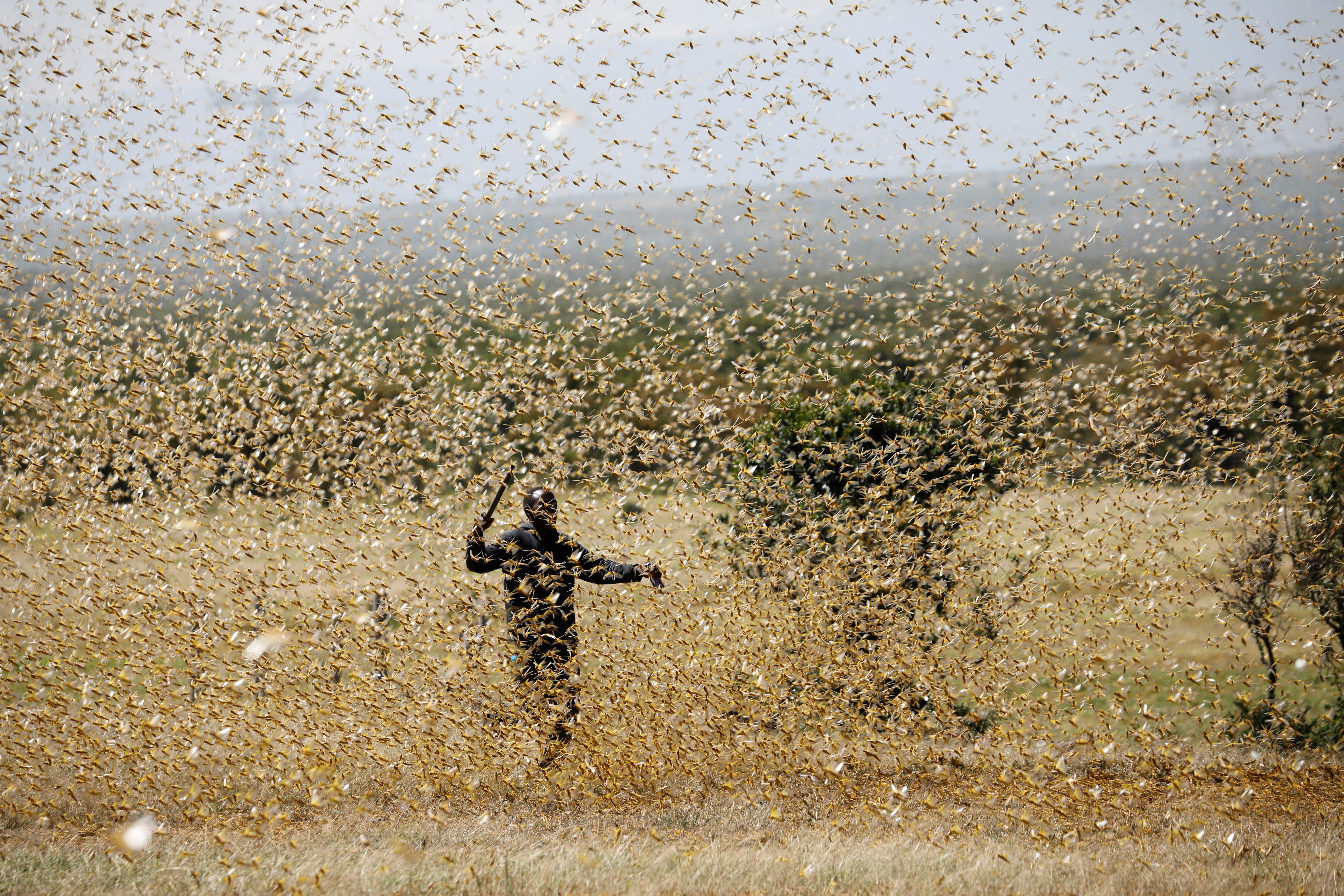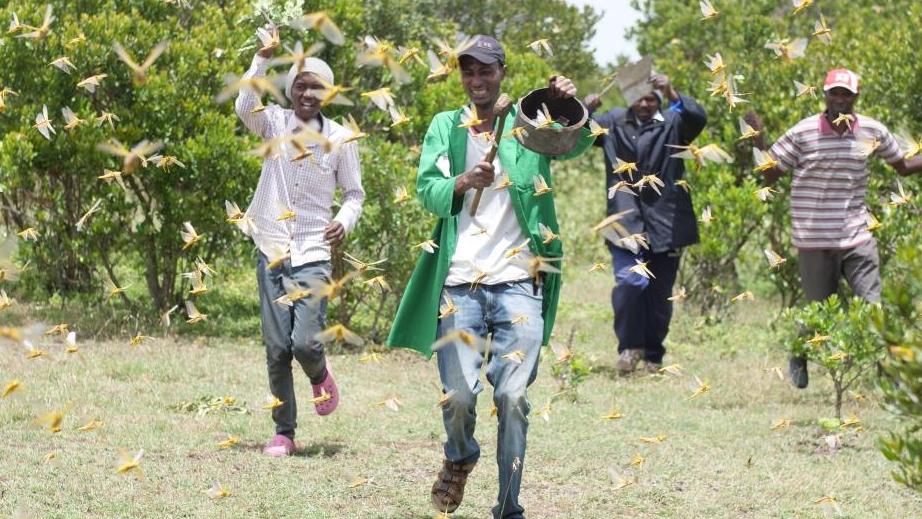Residents of Mahiga-Meru village chase desert locusts using old aluminum cooking pots, iron sheets and twigs, in Laikipia County, Kenya, Feb. 25, 2020.
Food supply chains are being disrupted all over the world due to restrictions to stop the spread of the coronavirus.
Related: Global disruption of supply chains impacts food security
In East Africa, it’s not just a pandemic making life difficult. Heavy rains during the most recent harvest and an ongoing locust outbreak devastated crops. Then, open-air food markets were closed to help prevent the spread of the coronavirus.
All of that creates major concerns over food security.
The locusts crossed into Kenya from Somalia and Ethiopia at the end of 2019 and have so far infested 26 Kenyan counties. As the eggs they have laid hatch, food experts have warned a second wave of young locusts will further destroy crops and vegetation, intensifying hunger and environmental damage.
Related: How Africa risks reeling from a health crisis to a food crisis

In Kenya, officials say around 12 million people don’t have enough food right now. Timothy Njagi, an expert in food security at Egerton University in Nairobi, spoke to The World’s host Marco Werman, about what this means for the region.
Marco Werman: We’ve all seen some of the videos of these swarms of locusts devastating fields. Millions of insects eating pretty much everything in sight. Even without COVID-19, how bad has this year been for herders and farmers?
Timothy Njagi: We have yet to establish the precise effects for what has happened. But I think, as you’ve seen even in the pictures, this is the worst locust invasion we’ve had in the country. This year, because we had above-average rainfall in most parts of the country, there was going to be adequate pasture were it not for the locust invasion. Farmers were expecting to have more in terms of production for both meat and milk. But right now, they’re struggling because there’s less pasture.
Timothy, it sounds like you’re in lockdown, judging from the children in the background. I’m just curious, as a food security expert in Kenya, how hard does it make your job not be able to go out in the field?
Actually, it is quite difficult because some of the information that we get sometimes you have to verify because sometimes, especially when respondents know how you’re going to use information, there’s the likelihood of exaggeration. But then also, in some areas, you still cannot get information on what is happening in those areas.
Related: Doctors wait hours to fill tanks as Venezuela faces fuel shortages
What limitations has COVID-19 actually put on food producers and how has it made it harder to fight the locusts?
So, for the locusts, the major strategy that the government has gone with is to use chemical pesticides. And most of these chemical pesticides are not manufactured locally. So, they have to be imported from outside. In March, we lost, like, two to three weeks because of the challenges in logistics. For food supply, again, we had a similar shock because Kenya announced the restrictions in mid-March. Immediately after that, we saw some local governments closing markets.
You’re talking about outdoor, informal markets, right?
Yes. Like, 85% of all food goes through the outdoor, informal markets. What happened was that some markets were closed. Some of these markets [are] very key distribution points, especially in urban areas. This means that for producers, it’s a terrible place to be, especially for farmers who are doing fresh fruits and vegetables and other perishable commodities like dairy, because you cannot store it. For the consumers, it means that you’re likely to pay slightly more because there are perceived, artificial shortages in the supply.
Related: As the coronavirus drags on, Mexico’s food prices soar
For Kenyans who could not afford to pay more for food, what have they been eating?
So, one of the challenges we’ve had for COVID is that people have also lost jobs. What we’ve seen was a lot of individuals doing a lot of charitable work. And then this quickly spreads to the civil society organizations, and now the government, as well, is also distributing food. So, right now, it’s more just an immediate response. It’s very short term, but we do hope that even as we go through the post-COVID period, we’ll be able to map out areas where people need more support in terms of access to food. And then we can have structured interventions.
So, planting season is happening now. Are you — are farmers — worried about next year?
We are really worried about next year, especially if the current crisis prolongs into summer. We import quite a number of inputs, including seed and fertilizer, and if the current scenarios persist, then we are really worried because that’s going to constrain access to inputs. Labor has also been a challenge right now. And one of the other problems is that agriculture in Kenya is highly labor-intensive. So, that has also been affected. So, when you have constrained labor and transportation, that really affects your efficiency when you’re trying to produce.
This interview has been edited and condensed for clarity. Reuters contributed to this report.
Our coverage reaches millions each week, but only a small fraction of listeners contribute to sustain our program. We still need 224 more people to donate $100 or $10/monthly to unlock our $67,000 match. Will you help us get there today?
